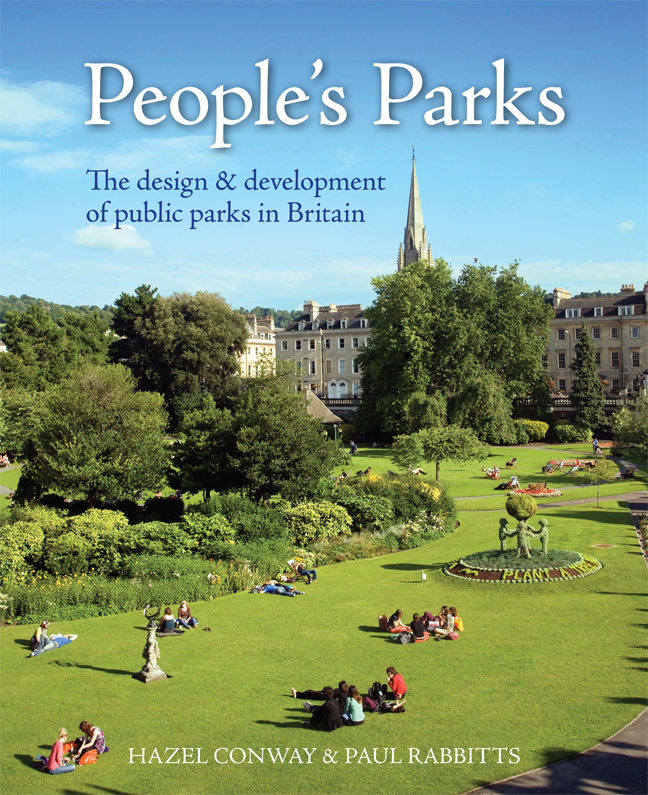Book contents
- Frontmatter
- Dedication
- Contents
- Miscellaneous Frontmatter
- Preface
- Acknowledgements
- Foreword
- A Word from Parks Professionals, Politicians and Parks Organisations
- Introduction: Dr Hazel Conway (1991)
- 1 Public Parks and Municipal Parks
- 2 The Need for Parks
- 3 Pioneering Parks Development
- 4 The Park Movement
- 5 Design and Designers
- 6 Lodges, Bandstands and the Cultivation of Virtue
- 7 Local Pride and Patriotism
- 8 Planting and Park Maintenance
- 9 Permitted Pastimes
- 10 Recreation Grounds, Parks and the Urban Environment
- 11 Public Parks, 1885–1914
- 12 Later Municipal Park Designers
- 13 Garden Cities and the New Towns Movement
- 14 Sport, Physical Activity and Recreation in Public Parks in the Inter-war Years
- 15 Parks Management – a Changing Perspective
- 16 Decline, Revival and Renewal – the Role of Parks into 21st-century Britain
- Appendix 1 Summary of main legislation promoting early park development
- Appendix 2 Chronology of main municipal and public park developments between 1800 and 1885
- Notes
- Bibliography
- Subscription List
- Index
16 - Decline, Revival and Renewal – the Role of Parks into 21st-century Britain
Published online by Cambridge University Press: 22 February 2024
- Frontmatter
- Dedication
- Contents
- Miscellaneous Frontmatter
- Preface
- Acknowledgements
- Foreword
- A Word from Parks Professionals, Politicians and Parks Organisations
- Introduction: Dr Hazel Conway (1991)
- 1 Public Parks and Municipal Parks
- 2 The Need for Parks
- 3 Pioneering Parks Development
- 4 The Park Movement
- 5 Design and Designers
- 6 Lodges, Bandstands and the Cultivation of Virtue
- 7 Local Pride and Patriotism
- 8 Planting and Park Maintenance
- 9 Permitted Pastimes
- 10 Recreation Grounds, Parks and the Urban Environment
- 11 Public Parks, 1885–1914
- 12 Later Municipal Park Designers
- 13 Garden Cities and the New Towns Movement
- 14 Sport, Physical Activity and Recreation in Public Parks in the Inter-war Years
- 15 Parks Management – a Changing Perspective
- 16 Decline, Revival and Renewal – the Role of Parks into 21st-century Britain
- Appendix 1 Summary of main legislation promoting early park development
- Appendix 2 Chronology of main municipal and public park developments between 1800 and 1885
- Notes
- Bibliography
- Subscription List
- Index
Summary
The importance of parks to the Victorians, which were pioneered so strongly by the great reformers, was ultimately lost in the 1970s and 1980s. In 1993, the Garden History Society and the Victorian Society produced a report entitled Public Prospects – Historic Urban Parks under Threat, authored by Hazel Conway and David Lambert. The aims of the report were to stress the historic importance of public parks and to draw attention to the threats which beset them. Both organisations were of the opinion that the conservation of parks’ historic interest was fundamental to their continued contribution to the life of our towns and cities. It was a milestone report highlighting the serious concern at the decline in many of our most important parks. It stated that
the sad state of many parks today is not always the fault of local authorities. Many have continued to provide high quality management in a maelstrom of administrative and financial reorganisation … our report is intended as a rallying call to Government for proper recognition of our historic parks, and more support for those local authorities and the staff responsible for the parks.
The threats to parks
The beginning of the decline of parks and the reasons for it have already been described in some detail. Historic parks such as Sefton Park, Liverpool; Avenham and Miller Park, Preston; Kelvingrove Park, Glasgow; and People's Park, Halifax, were victims of such decline, along with many others. Buildings and statues were in a very poor condition, buildings boarded up, palm houses left derelict, and bandstands empty and rusting, where they remained. In Sefton Park, Liverpool, the heads of Peter Pan's fairies had been cut off. Boathouses were burnt out in places like Dartmouth Park in West Bromwich. The Grade A-listed pavilion in Paxton's Baxter Park, Dundee, was boarded up and covered in graffiti. Parks in Middlesbrough appeared abandoned, with only nefarious activity dominating. The lack of visible park staff led to the increasing unease about levels of personal safety in parks, particularly for women. As a result, parks were less used, unease increased and the spiral of decline proceeded rapidly.
The continued problems from budgetary cuts and the changes allowing local authorities to sell off assets and use 100 per cent of such funds for capital purposes encouraged them to look at assets they could sell for redevelopment.
- Type
- Chapter
- Information
- People's ParksThe design & development of public parks in Britain, pp. 265 - 292Publisher: Boydell & BrewerPrint publication year: 2023

